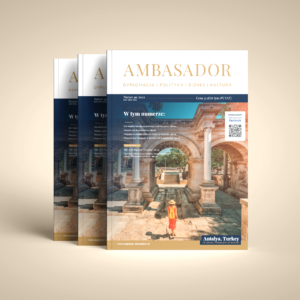On 6 February, the Diplomatic Opening of the Year took place at the PKOL Olympic Centre. This prestigious event is organised by the Polish Chamber of Commerce. Every year, it brings together diplomats, representatives of public and local government administration and business leaders.
This year’s edition of the Diplomatic Opening of the Year was special. There were several reasons for this. Firstly, this year the KIG is celebrating its 35th anniversary this year. In addition, the jubilee edition of the DOR took place during the Polish Presidency of the Council of the European Union.
Jerzy Dróżdż, head of the team of advisors in the Office of the President of the KIG, opened the event and welcomed the guests, who were also greeted by Andrzej Arendarski, President of the PCC, and Marek Kłoczko, President of the PCC.
The topics of this year’s discussion were international cooperation and the geopolitical situation, the main challenges and opportunities for the Polish economy, and support for Polish companies expanding abroad. The interlocutors pointed to the security of the state and the competitiveness of the economy as priorities for Poland in 2025. This was also emphasised in his speech by Adam Szłapka, Minister of EU Affairs, in his speech:
– The slogan of the Polish Presidency is security and this is also our priority. We are talking about security in seven dimensions: external, internal, information, economic, energy, health and food security. (…) Security and competitiveness are the watchwords which should accompany the entire European Union in the next six months. (…). (…) The Presidency is not an end in itself; it is a tool to change the policies of the entire European Union in order to make it more competitive and more favourable to entrepreneurship.
In turn, Deputy Foreign Minister Andrzej Szejna, who was the first to speak in the debate entitled ‘If we don’t stop ourselves, no one will stop us – challenges for economic diplomacy and priorities for 2025’, moderated by Andrzej Szumowski, Director of the Foreign Relations Office, said that 2025 would be a difficult challenge for the Polish Presidency due to the situation in Ukraine, terrorist attacks by Russia and attacks by Russian services on Polish infrastructure, which occured almost every day. Therefore, according to Deputy Minister Szejna, we need a Europe of solidarity, a Europe in which the arms industry is strong and Polish diplomacy is also economic diplomacy, but under new conditions.
Mirosław Czekaj, President of Bank Gospodarstwa Krajowego, meanwhile, said: The Diplomatic Opening of the Year is a meeting of people and institutions that are interested in development. Bank Gospodarstwa Krajowego, which he represents, has had one unchanging mission for 100 years – to support Poland’s economic and social development. Among the most important tasks currently facing the BKG, President Czekaj cited the financing of the energy transition, the modernisation of the army, and social housing. These priorities, according to the President, are also defined by the Polish government and by instructions related to the implementation of tasks within the EU.
The Minister of Development and Technology, Michał Jaros, drew the audience’s attention to the issues of security for Polish companies based on healthy and equal competition. – These are key issues for the country’s development . We need to protect our economy, not only the Polish one, but also the European one – the Minister argued. He added that it was also important to open up new markets. – We have to look for places where Polish products can do well (…). This is the most important issue for us today – stressed the minister.
Deputy Minister Stefan Krajewski addressed the issue of food security in his speech. – Food security is just as important as military or energy security – the Minister explained.
Another panellist, Konrad Wojnarowski, Deputy Minister of Funds and Regional Policy, referred to three keywords: deregulation, understood as the resilience and security of the Polish economy, decarbonisation, understood as the energy security of the entire EU and the competitiveness of small and medium-sized enterprises. He also mentioned innovation and betting on solutions related to digitalisation. From the perspective of Poland’s 20 years of EU membership, he believes it is also important to talk about the competitiveness of Polish regions. Indeed, it is the Polish regions that have had the greatest impact on the development of many social, local and economic initiatives related to entrepreneurship. As Minister Wojnarowski pointed out, Poland remains the most decentralised country when it comes to European funds – 44 per cent of the funds are at the disposal of the regions, at the disposal of the marshals who manage these funds.
The second panel discussion entitled ‘When others are wringing their hands, we are looking for opportunities, we are acting, we are outperforming the competition…’ was chaired by Piotr Soroczynski, Chief Economist at the KIG.
During the debate, the Marshal of the Mazowieckie Voivodeship, Adam Struzik, pointed out that from the point of view of local government, economic development, own and foreign investments are the key to competitiveness. – The year 2025 will be the 35th year of reborn self-governments in Poland and the 26th year of strong regions. It is in the self-governments that enormous civilisational progress has taken place. It is the self-governments that support the development of entrepreneurship, make significant use of funds coming from the cohesion policy with the European Union and also create 42 per cent of public investments – Marshal Struzik pointed out.
The Marshal of Podlaskie, Lukasz Prokorym, in turn, drew the attention of the audience to the qualities of the region he administers: Podlaskie is not only nature and tradition, but also modernity, innovation and huge economic potential. This event is another step in building Podlaskie’s strong position in the country and the world.
On the one hand, Rafał Żelazny, President of KSEZ, argued that the geopolitical situation and the high interest rate environment are both obstacles to investment in Poland. On the other hand, he pointed out that economic zones have instruments to encourage investment .
– One such instrument is tax exemption, which ranges from 40 per cent for large organisations to 60 per cent if we are talking about micro businesses from the amount of profit made – he explained. He added that the share of foreign capital in Poland is currently increasing. – In terms of value, it is more or less half and half, because foreign companies simply invest more, the President explained.
The official part of the ceremony ended with a gift raffle. A voucher sponsored by LOT Polish Airlines was drawn, and before handing it over to the winner, President Michał Fijoł gave the audience an insight into LOT Polish Airlines’ development plans for 2025.
The final part of the event took place in a networking atmosphere. Here, too, economic issues dominated. There were also discussions on security, energy and food security in Poland and Europe.



Sledź nas na: